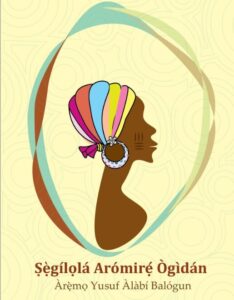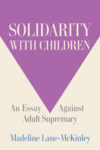
[2023]
There’s something arresting about reading a novel in your mother tongue, especially when that tongue is Yorùbá, layered with idioms and inherited violence. Arẹmọ Gemini’s Ṣẹ̀gílọlá Arómirẹ́ Ògìdán is not merely a literary debut—it is an act of cultural memory, feminist provocation and linguistic defiance. This narrative reads as ancestral, yet remains blisteringly contemporary. At its center is Segilola, a woman ensnared by choices that were never fully hers. One of the most difficult parts of the novel is watching Segi give and give to a man who offers her nothing in return, who only takes, draining her until there’s almost nothing left. Her life unfolds in the tight spaces between love and betrayal, trauma and transformation. She is not the heroine we’re used to. She is not clean, unbroken, or consistently likeable. And that, perhaps, is the novel’s first radical act.
In Gemini’s novel, misogyny is not theoretical. Structural violence is not just embedded in policy, but experienced viscerally in the body. It manifests through silencing and the everyday cruelties of a society built to work against women. Segilola’s pain is carved into her experiences, into the relationships that fail her, and into the rituals of shame she is forced to perform. The novel forces us to sit with hard questions: What does justice look like in a society that only offers redemption to men? What happens when survival demands that a woman become the very thing the world fears?
Ṣẹ̀gílọlá Arómirẹ́ Ògìdán dramatizes misguided love, the ways women are taught to contort themselves in the name of affection, devotion, or survival. For Segilola, love is a lesson learned through sacrifice, without clarity, consent, or reciprocity. She loves blindly, intensely, and often to her own detriment, as in her fateful agreement with her lover, Gbenga, to sacrifice her body to the chief in exchange for money, a choice that set her life on a downward spiral. In giving herself so completely, she begins to vanish.
The tragedy isn’t just that she is betrayed; it’s that she never truly knew how to love herself in a world that demanded she center everyone else. We witness the erosion of selfhood, how women are conditioned to conflate suffering with loyalty, to interpret manipulation as passion, to mistake being needed for being loved. What remains of a woman who has given herself away, piece by piece, kiss by kiss, wound by wound? Her undoing is not only in what others take from her, but in what she willingly surrenders under the illusion that love must hurt to be real. And when that illusion shatters, what’s left is rage, loneliness, and the slow, stubborn path back to personhood.
The novel is narrated in the third person, but the intimacy of the voice often pulls us deep into Segilola’s emotional world, so much so that it can feel like first-person narrative. This closeness intensifies the reading experience, making each betrayal, each moment of despair or defiance, feel immediate and personal. The result is a narrative that straddles the boundary between observer and participant, allowing the reader to witness Segilola’s story while also feeling, viscerally, what it costs her to survive it.
The novel probes the weight of taboos, those unspoken laws that govern women’s bodies, desires, and destinies. Abortion. Infidelity. Sex before marriage. Speaking out. Leaving. Seeking pleasure. Seeking revenge. There is always a price, and it is always too steep. Gemini is not interested in moralizing. Instead, he drags taboo topics into the light and lets them breathe. Take, for instance, Segilola’s mother placing a magun (thunderbolt) on her daughter’s body, not out of cruelty, but as a desperate attempt to protect her child, having been raped herself at a young age. That act, intended as protection, became the beginning of Segi’s woes.
For Segilola, motherhood is not a sacred calling, but an arena of contradictions. The novel asks: What kind of mother is a woman allowed to be? One who sacrifices? One who submits? One who regrets? We witness how society weaponizes motherhood as a tool of control, demanding that women absorb pain in silence and prioritize their children even when the world gives them nothing in return? Segilola, as a mother, is imperfect and human, and her story reflects the unspoken grief and rage many women carry but are never allowed to name. This comes to a head in a particularly devastating scene where she returns from prison to find her son, Enitan, no longer the child she left behind. In her absence, he has been raised by Gbenga, her former lover, a man who once pretended to love her but discarded her and undermined her at every turn. Gbenga indulges Enitan without discipline or direction, encouraging behavior that is rude, entitled, and dismissive. Enitan becomes a tool, used to shame Segilola, to reinforce her absence, to question her worth. In this moment, Gemini shows how the failures of men are often deflected onto the women who survive them. The scene concludes not with a tidy reconciliation, but with heartbreak: Segilola must now mother a stranger, and reckon with the knowledge that her love alone may not be enough to undo what patriarchy has done through others.
There’s a quiet rage that simmers in this novel, rage not from sudden injustice, but from years of accumulated hurt. Formally, this rage is not contained; it leaks into the very structure of the narrative. The story unfolds in jagged fragments, refusing linearity. Memory intrudes without warning. Trauma resurfaces in elliptical language. By the same token, Segilola’s descent into madness is neither neat nor justified by conventional morality. Her anger lives in the syntax, in sentences that run long, breathless, or suddenly halt. It pulses in tonal shifts that veer from soft lament to biting defiance, refusing the reader comfort. But in a world that routinely denies women justice, reclaiming power, even through violence, is a kind of agency.
Writing this story in Yorùbá is itself a form of rebellion. Gemini resists the demand for translation, for dilution, for Western legibility. The negative connotations might come to the reader’s mind. Yoruba, expansive, layered with meaning, is not just the medium but the message. You must meet the story on its own terms, with its own cadence and values. For Gemini, this isn’t simply about writing in an indigenous language. It’s a declaration: there is no single way to tell Yorùbá stories. They don’t all have to carry moral lessons, tie up neatly, or present virtuous protagonists. By rejecting didacticism, Gemini opens up space for Yoruba storytelling to be just as complex, raw, and unapologetic as the lives it reflects. This is not just cultural preservation alone but also a political act. In a post-colonial world that often equates English with sophistication, Gemini reminds us that there is nothing minor about our languages or our stories.
Ṣẹ̀gílọlá Arómirẹ́ Ògìdán is not an easy book. It doesn’t soothe. It doesn’t explain. It doesn’t entertain in the conventional sense. Instead, it unsettles. It exposes. It bleeds. And in doing so, it opens up space for healing, for reflection, for dialogue. As a feminist, I read this novel as both a critique and a love letter, to the women who love, who seek joy, who mourn in silence, who dream anyway. If you’re looking for neat resolutions, look elsewhere. But if you’re ready for a story that asks what it truly means to be a woman in a world that punishes you for existing, then this novel awaits you (with reckonings).
Azeezah Adekanmbi is a writer, researcher, and a final year student of Archaeology and Anthropology at the University of Ibadan. Her work moves across archives, heritage, queerness, and memory, often tracing how lives and histories are represented, and misrepresented, through cultural forms. Beyond academia, she runs a fashion brand rooted in accessibility and self-expression, and curates conversations on film and literature.
This post may contain affiliate links.






